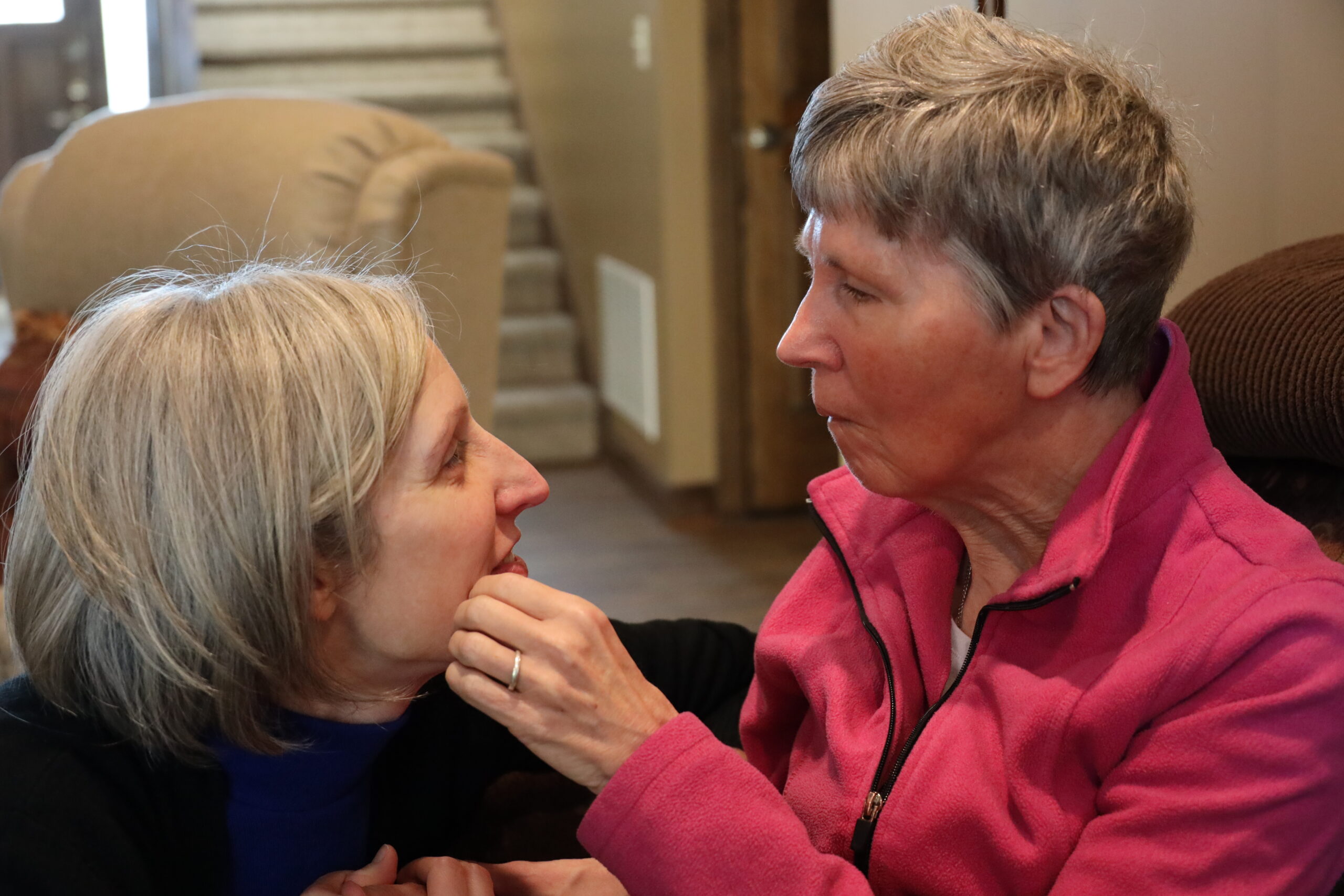
Jessi Kary, left, national director of the Pro Sanctity Movement, visits with Teresa Monaghen, a former Pro Sanctity director who suffers from Alzheimer’s disease. They live in community in Elkhorn with four other Apostolic Oblates in the movement. SUSAN SZALEWSKI/STAFF
Living Mercy
Alzheimer’s disease shows community a different path to holiness
February 16, 2024
With gentle hands and strong arms and backs, two of the Apostolic Oblates of the Pro Sanctity Movement in Elkhorn lift and guide the woman who for years spiritually lifted and guided them.
They and others in the community smile and look into her eyes as they visit with her and even sing to her.
They show her the many photos she collected, and they read to her.
They put their arms around her and kiss her on her cheek, and on a good day she will kiss them back.
But Alzheimer’s disease has diminished the responses of their former leader and mentor, Teresa Monaghen. Sometimes she smiles and laughs and looks knowingly into their eyes. But Monaghen’s eyes have become increasingly vacant. She needs help with everyday tasks and relies completely on others for help.
As the 69-year-old enters a more severe stage of Alzheimer’s, she and her caregivers are offered new opportunities for holiness. Everyday holiness, afterall, is what the Pro Sanctity Movement is about.
The journey of the Apostolic Oblates has been painful since Monaghen’s diagnosis in 2019. But they know that God in His providence has allowed the incurable disease – with its deterioration of mind and body – and speaks to them through it.
Holiness involves an “invitation to just respond to the circumstances in front of us,” said Jessi Kary, national director of the Pro Sanctity Movement and one of the five women who live in community with Monaghen at their Elkhorn home.
Those circumstances are “not a surprise to God,” Kary said. “They’re part of His providential care and love. So to really trust that even this is part of His divine plan – and is a gift especially – it was something I think all of us have learned from Teresa and also experience in our own different encounters and experiences.
“This, too, is a gift,” she said, “and it’s not something to bear or to experience as a burden, but to really find the grace that’s in it.”
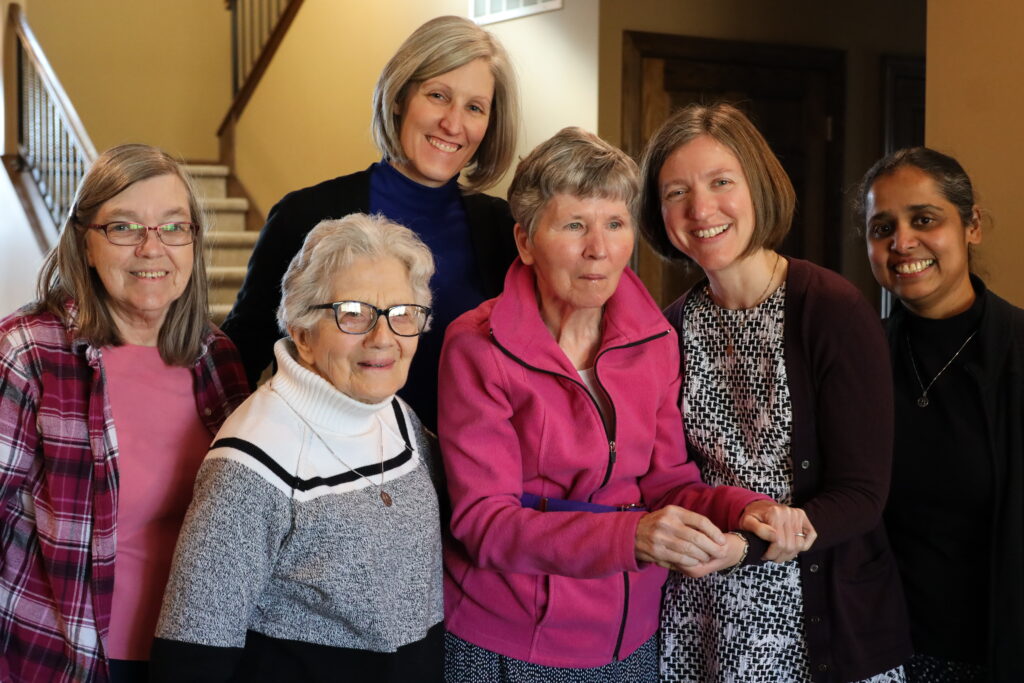
Members of the Apostolic Oblates community in Elkhorn surround their mentor and former leader, Teresa Monaghen. From left is Anne Zugelder, Franca Salvo, Jessi Kary, Monaghen, Monica Hejkal and Margaret Mathew.
Monaghen’s five-year decline has seemed rapid, Kary said. Beginning last spring, the community brought in professional caregivers to help.
“We are still called to run the retreat center and help with the movement and do our apostolate, so having outside help is necessary to be able to do that,” she said.
But dealing with the illness has changed the community, individually and as a group.
The way that Monaghen has responded to Alzheimer’s and the way the other Apostolic Oblates in her community care for her has become a way to deepen their relationship with God and a way to evangelize to others through “the gift of taking care of each other,” Kary said.
“I think that’s a special grace that we’ve been receiving that we’re called to share,” she said. “Teresa has been accepting a grace, too. The way that the Lord’s inviting her to live right now is a testimony all the time.”
“There’s real suffering, for sure, for Teresa and for things we say no to because of our yes to Teresa and to our community life,” Kary said.
“We could take more groups or go on different missions. Yet this ‘yes’ that the Lord’s inviting us into has a ripple effect into the world. Whatever the activity that the Lord is calling us to will bring His redemption into the world and have consequences far beyond what we can ever imagine.
“So going for a walk today with Teresa, if that’s the thing I’m supposed to do, is way more fruitful than giving a talk or a retreat or doing some great activity that might seem more important. But really the Lord’s gift to me today is to say yes to the person in front of me.”
Their care for Monaghen and each other is woven into their day.
“We kind of tag team and take turns on our responsibilities with Teresa,” Kary said.
“It can seem overwhelming. It can seem too hard. It can seem all sorts of things, and not everyone’s called to do what we’re doing,” she said.
“But I think that we also kind of lack an imagination as a culture of seeing how good it can be and how much the Lord can do in the limits.”
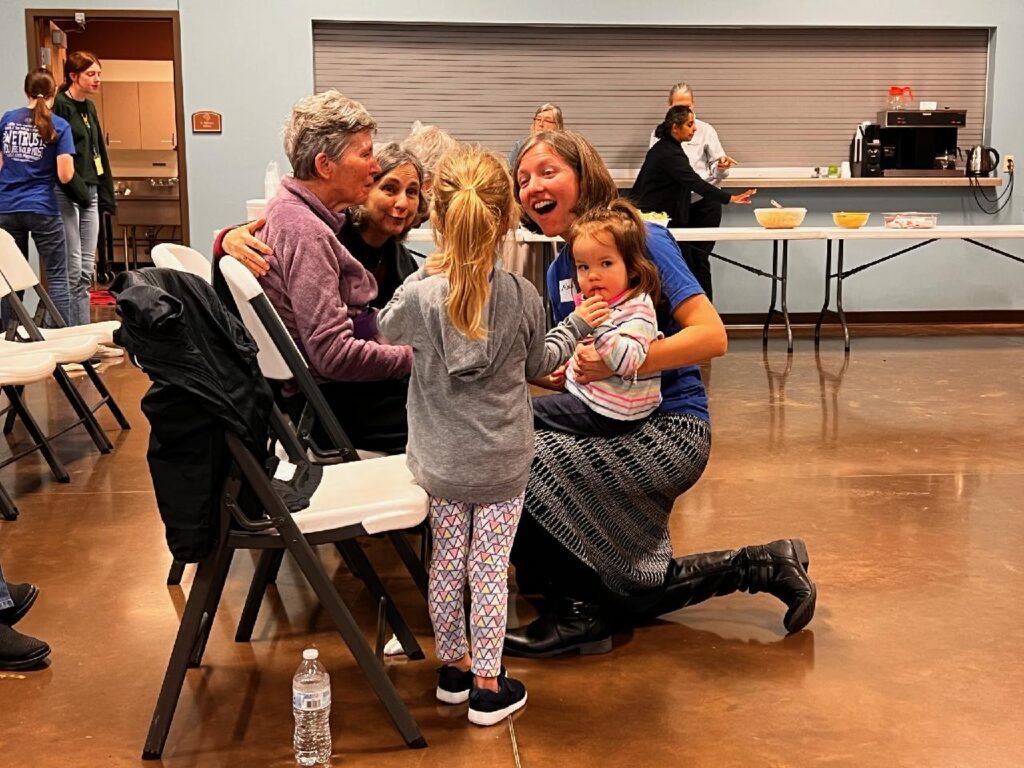
COURTESY PHOTO
As Monaghen’s disease has progressed, she and Kary and the four other women they live with have kept their home open to visitors and have continued Pro Sanctity retreats, spiritual direction and the summer Camp Fun & Faith for Girls. All these endeavors were brought about through Monaghen after she moved to Omaha in the 1980s.
The former Pro Sanctity director has been “kind of a rock here in the archdiocese for many years,” Kary said. Monaghen was instrumental in purchasing the movement’s Elkhorn property in 1991 and “then having a vision for the retreat center here.”
Elsewhere in the archdiocese, “she’s had her fingers in all sorts of things,” including the establishment of Spirit Catholic Radio, the Institute for Priestly Formation, Heart of a Child Ministry and more.
“She’s kind of a great bridge between lots of the different Catholic groups in the archdiocese,” Kary said. “She’s very much a key, central figure in the local Church as well as in our institute.”
Monaghen served as a spiritual director for many people and has been known for her joy.
She became interested in the Pro Sanctity Movement while a college student in California. There she joined the movement’s Institute of the Apostolic Oblates and as part of her consecration in 1978 took vows of chastity, poverty and obedience.
Monaghen went to Rome – where the movement was founded in 1947 – for three years before moving to Nebraska.
“She was asked to come to Nebraska and never left, which is kind of rare,” Kary said, “but the Lord and the institute had her stay here.”
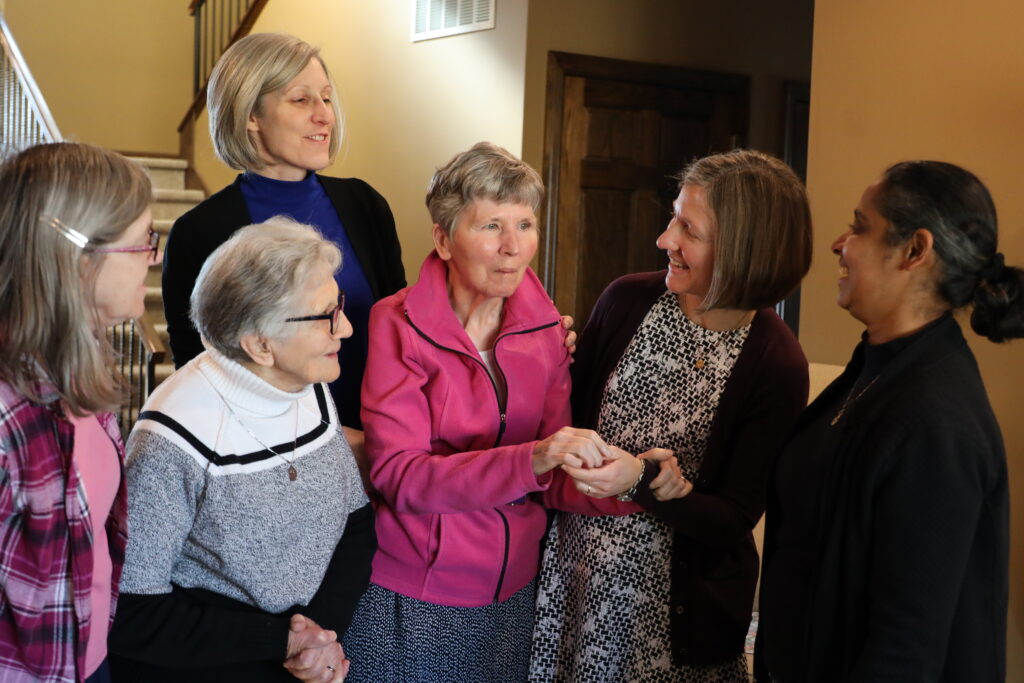
Oblates can be “interns,” who live in community and are willing to serve in different locations on mission, or “externs,” who live separately and are not called to service elsewhere.
Monaghen chose to be an intern within the secular institute, currently living in community with Kary, Monica Hejkal, Margaret Mathew, Franca Salvo and Anne Zugelder. Daily the community of six prays, worships at Mass and shares meals and chores.
Salvo, at age 89, is the oldest member and a longtime Apostolic Oblate. Because of her age, she can’t participate in a lot of chores or in the heavier work of Monaghen’s care.
So while others are washing dishes after dinner, Salvo visits with Monaghen and sings, often in her native Italian language.
“She is our dear sister, and we love her very much,” Salvo said.
She once wanted to be an opera singer, Kary said, “so Franca’s desires are now being fulfilled in our community, and Teresa is receiving the gift. And we can sometimes hear her in the kitchen, too.”
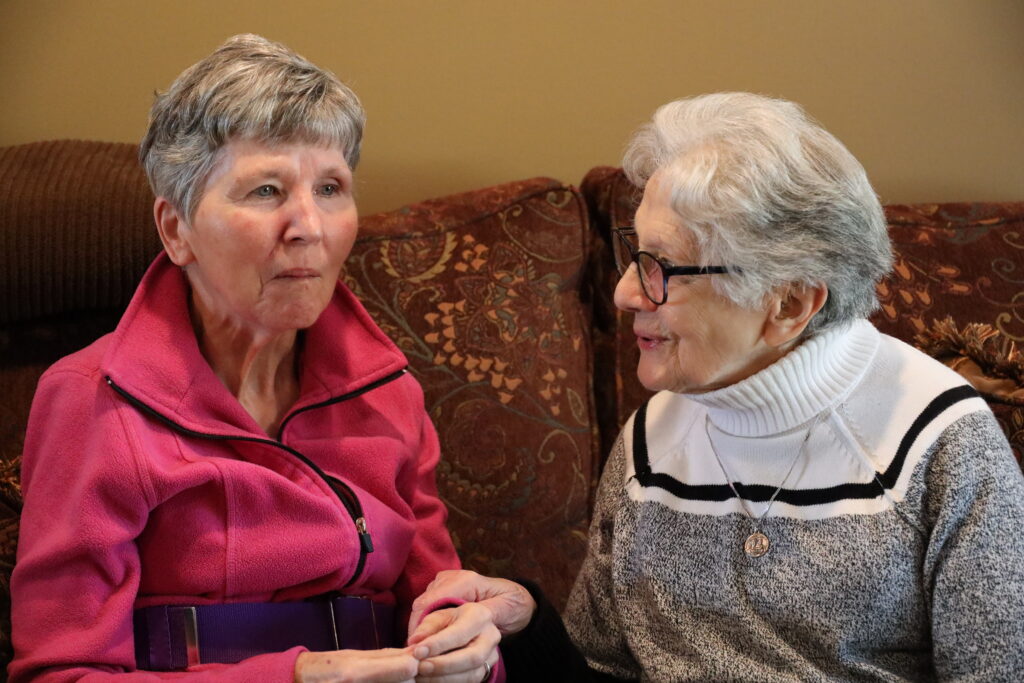
Franca Salvo, right, visits with Monaghen. Both are longtime Apostolic Oblates and friends.
Salvo and Monaghen have known each other for decades. Salvo remembered when her friend was just a college student. “She was a beautiful girl, so dynamic,” who was drawn to a life of prayer and intimacy with Jesus, in fraternity and in promoting the idea that everyone is called to holiness.
“Just listening to what the Lord wants and doing as much as we can,” Salvo said.
“If we are in touch with Him, we try to do what He wants. So this is our goal, to try to do what we can, first of all to be witnesses: people who really love one another, help one another, live a life of peace and joy.”
Mathew tries to bring out the playfulness in Monaghen.
“We call each other funny sisters,” Mathew said.
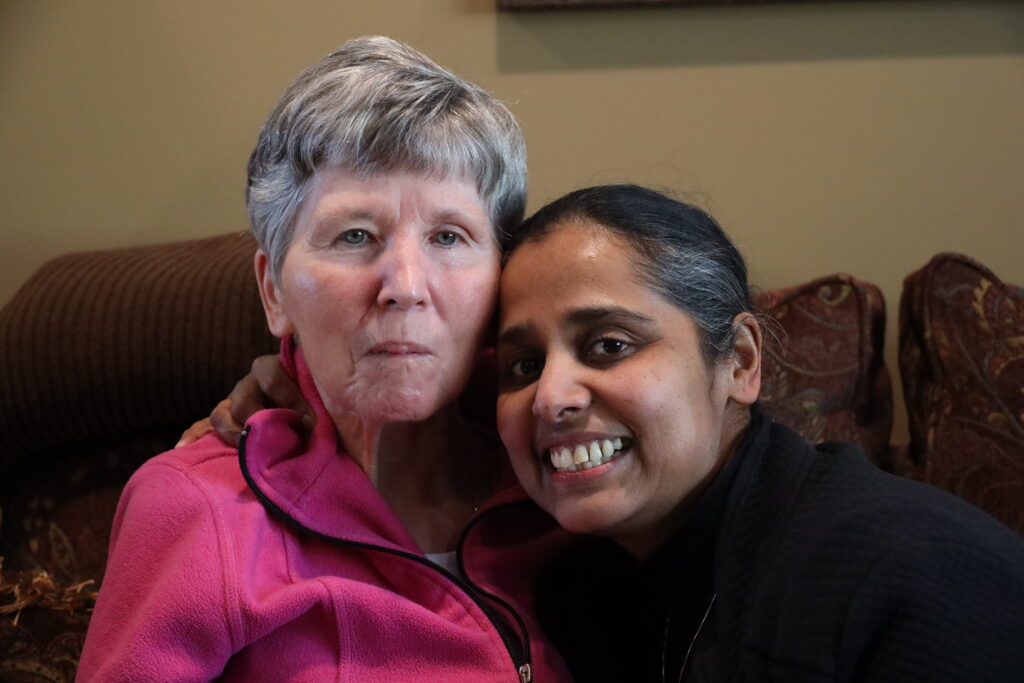
Apostolic Oblate Margaret Mathew gives Monaghen a hug.
“Franca would sing, then I would dance for her, just take actions that make her laugh a lot,” sometimes as a way to distract Monaghen, keep her awake or make her smile.
“We spend a lot of time telling stories and reminding her of all the stories,” Mathew said. “And it’s a great blessing. It’s beautiful to speak with her, and we really enjoy each other.”
She said she sees the way Monaghen still looks people in the eyes and says “God bless you” and “Thank you.”
That is Teresa’s witness now, Mathew said.
“To live with Franca and Teresa is a great blessing for us, to see their faithfulness in prayer and their oblation. … We are rich in that way. These two are the richest in our community right now, leading us to the call to holiness. And that way, we can give it to other people.
At night when Monaghen goes to bed, “I say goodnight, Teresa. Sweet dreams,” Mathew said. She kisses her friend on the cheek, and her friend kisses her back.
She sees Monaghen as a living saint.
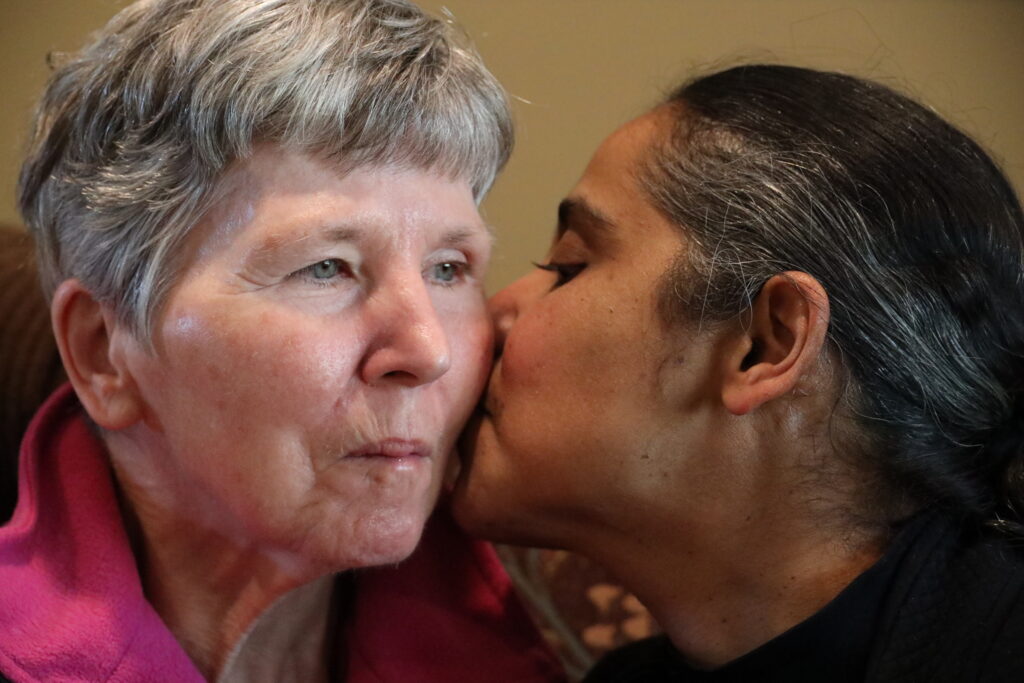
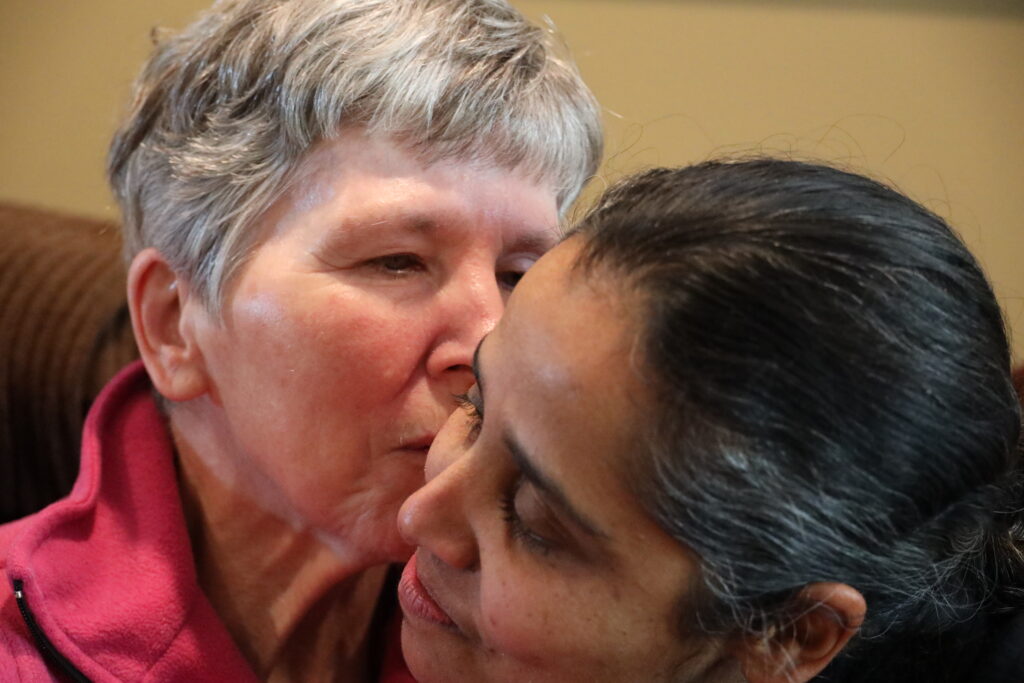
Whenever Zugelder has to leave her community, she makes sure to send Monaghen mail, even little notes.
“She really likes to receive mail,” Zugelder said. Monaghen carries the letters with her, looks at them and even will smell pictures of flowers.
She especially likes flowers, Zugelder said. “She loves flowers. She studied horticulture in college.”
The two look at photo books together. “This is when Margaret took her final vows,” Zugelder shows Monaghen.
“She made photo books over the years on everything,” Zugelder said. “It’s really nice now because we can take them out and she can see pictures of the things that she did when she was younger.”
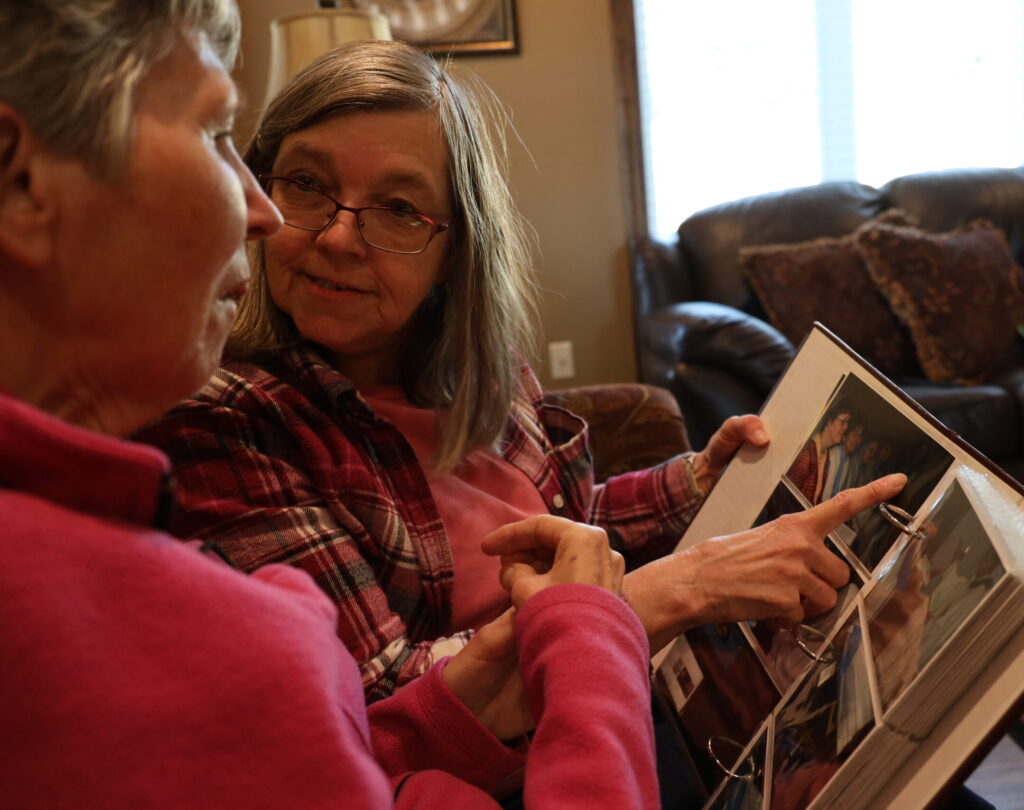
Apostolic Oblate Anne Zugelder goes through photos with Monaghen.
Zugelder recalled when she first arrived in the Omaha area, and how Monaghen showed her around. “She’s always had the ability to really get to know people really fast. She has a love for people and for bringing them to know Jesus more.”
Hejkal walked with Monaghen inside their home using a device called a gait belt for support.
“You’ve been having a busy day, huh?” she says to Monaghen. “Hey, Teresa. Hi, how are you?”
“So Teresa has been one of my mentors since I was a little girl,” said Hejkal, who grew up in Omaha. “So I learned all sorts of things from you,” she says as she looks at Monaghen.
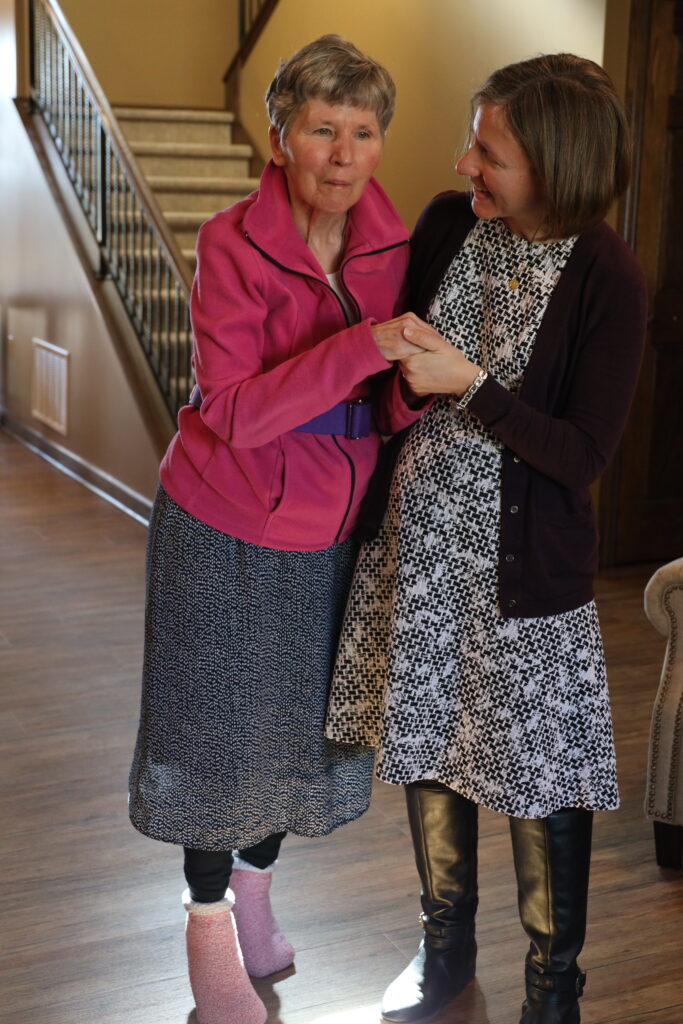
Monica Hejkal takes Monaghen on a little walk inside the Elkhorn home they share with four other Apostolic Oblates.
“Remember you taught me those songs when I was a little girl? You taught me to love our Blessed Mother. So I think of you when I sing: ‘O, how I love Jesus.’
“O, how I love Jesus, O how I love Jesus,” Hejkal sings.
As the two interact, Monaghen smiles slightly.
“I think I see a smile there,” Hejkal says. “Yeah. Excellent.”
“What else did I learn from you? The power of the pause. You always liked the power of the pause. Notice what the Lord is doing right now. He’s right here, right now. … So we have to pause. … I show my heart to Him, and I find Him listening.”
“So what I found is Teresa just lives that spirituality,” Hejkal said, “right here in the present moment. That’s where God is, and that’s where you are,” she tells Monaghen, “where you are with Him.
“And you teach us to do the same.”
“And you always bring out the best in people,” Hejkal goes on. “It’s still happening. Ever since I’ve known you … if it’s a little seed of goodness, you pull it out. If there’s a talent, you say ‘Hey, let’s bring that talent up, let it grow. … Look at what God can do.”
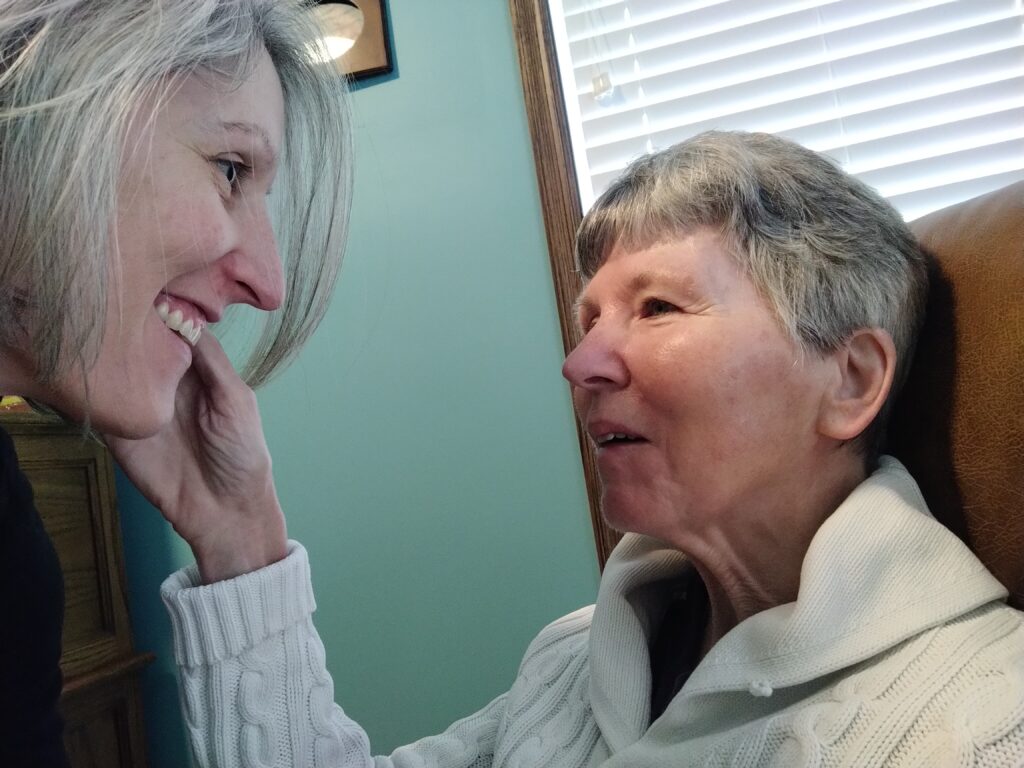
COURTESY PHOTO
Sometimes a person’s disposition can be difficult and combative with Alzheimer’s, but “Teresa is utterly serene and extremely pleasant,” Kary said.
“She really prayed her whole life, so I think that she is just resting in the graces of being with the Lord and knowing Him and surrendering her experience of suffering to Him.”
Linda Shrek, one of Monaghen’s three professional caregivers, says she has taught her patience, particularly in the way that she never raises her voice.
“She is wonderful,” Shrek said. “She’s got so many friends who come and visit every day. … They all say that they wouldn’t be who they are today if it wasn’t for her showing them the way.”
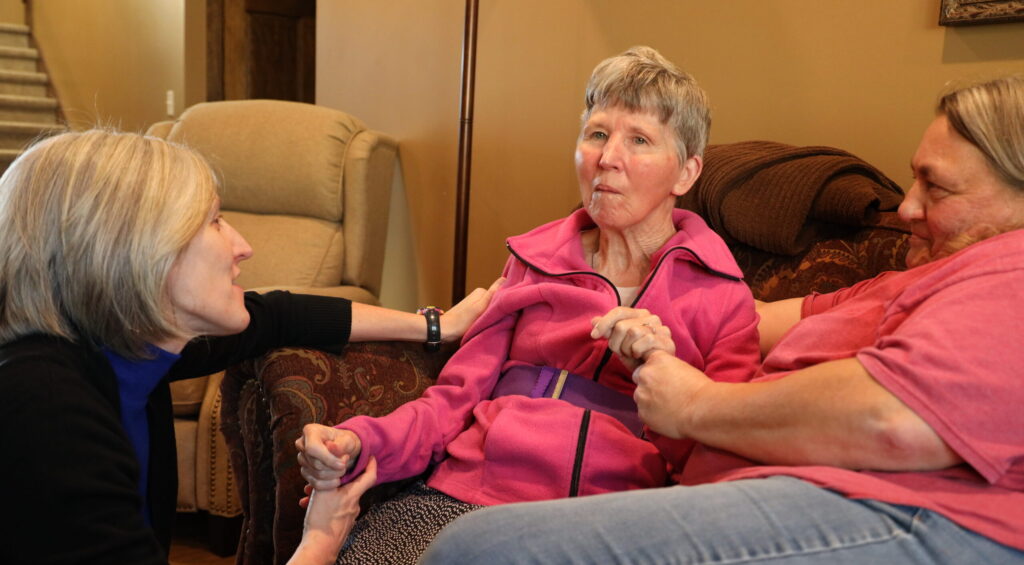
Linda Shrek, right, is one of Monaghen’s three professional caregivers.
Initially adjusting to Alzheimer’s seemed difficult for Monaghen, Kary said. “She was losing everything that she had known, but really she shared with people and invited people to trust and become totally dependent on God. And she just does that every day. She has no ability to take care of herself. It’s this witness of a real abandonment to the Lord’s care and providence.
“So we get to be a little part of that for her, that the Lord uses us as His instrument to care for her. But it really is Him taking care of her.”
The skills of her five community members have been well suited for Monaghen’s care.
“It’s really quite remarkable – God’s providence – that one of our members is trained as a physical therapist,” Kary said. “So she knows how to transfer people and walk with people.
“And I worked in hospice before I joined the institute, so I used gait belts and cared for patients who had different capacities for mobility and things like that. Then one of our other members was trained in a nursing environment in India, so she has a lot of practical patient experience.”
The Apostolic Oblates see God at work everywhere around them, even in terminal illness.
“We’ve all received the gift of each other also in a way that we wouldn’t have without coming together to care for Teresa as a community,” Kary said. “Not one of us could do this alone at all.
“But together we bring different gifts, and we all bring our different relationships. That has also helped us to treasure and value each other and be a source of communion.
“And that’s Teresa’s charism in the call of holiness,” Kary said.
“She saw this way to be in communion with everyone. She brought a deeper experience of communion into our own community, particularly in her poverty and circumstances of her illness – even more so than in her many great capacities, which were all beautiful.”